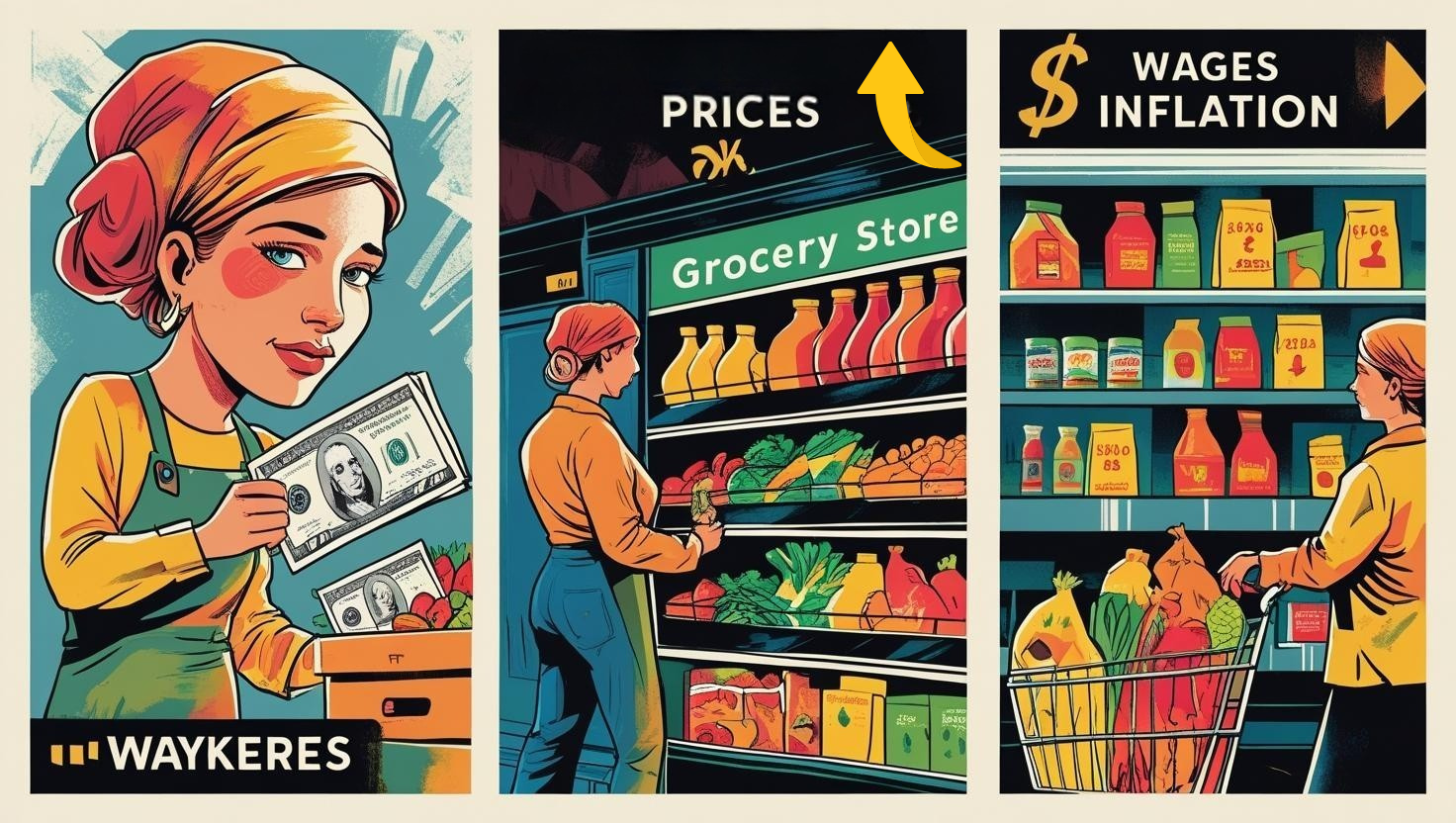Inflation is a big deal, but lots of people don’t get how it affects them. Everything is getting more expensive, so what’s the actual effect on your finances?
This blog post explains inflation, its connection to wages, and how rising prices faster than income affect your life. We aim to show how inflation affects your money, paychecks, and your daily life in the US and Canada.
What Is Inflation, and Why Does It Matter
Inflation is when prices rise and your money buys less. The Central banks aim to have around 2% inflation. Even though high inflation is negative for a country, a small inflation stimulates growth, which can cause an increase in consumer spending and investment, fueling economic growth.
Mild inflation can help boost the economy. However, when it grows faster than your pay increases, that’s when it has a negative impact on your way of life. The amount in your bank account and your pay is going down, even though the number still looks the same. That’s because that amount becomes less valuable. If you want to stay ahead of this and understand what the value of your money is in the present economic environment and the projection for the future, please check out our inflation impact calculator here.
Wages vs. Inflation: The Real Story
Let’s say prices increase by 5% this year, but your salary only goes up by 2%. You’re earning less than last year because your income buys fewer goods and services. We call this a decline in real wages.
Nominal wage: This is your wage before you adjust it for inflation.
Real wage: This is what you earn after inflation. This reflects your true buying power.
If your cost-of-living raise equals the rate of inflation, then your real wage stays the same. You won’t feel richer, but you won’t feel poorer either. The issue arises when pay raises fall behind inflation, which has been a growing concern in both the U.S. and Canada.
Inflation in Action: A U.S. Case Study
In 2022, inflation in the U.S. hit a high of 9.1%. This is the highest in over four decades. Meanwhile, average wage growth hovered around 5.2%. That’s a gap of nearly 4 percentage points, meaning millions of Americans lost ground financially despite receiving raises. It’s tempting to think that a raise shields you from inflation. But that only works if your salary increases at the same rate as inflation.

Who Is Most Vulnerable to Inflation?
Some groups are more vulnerable because they don’t have many ways to make more money. These groups include:
1. Retirees and Pensioners
Many retirees live on fixed incomes like pensions or government benefits. These payments don’t increase with inflation unless they’re indexed to the cost of living, like some versions of the Canada Pension Plan (CPP) or U.S. Social Security; therefore, their buying power declines.
2. Low-income Workers
People in low-paying jobs like retail or gig work have little say on pay and miss out on inflation-based raises.
3. Young Professionals
New entrants to the job market may not receive wage increases for several years and are more sensitive to shifts in grocery, prices inflation and rental costs.
4. Single-income Families
A household relying on one income has less flexibility to absorb rapid increases in essential goods, especially when real wages are shrinking.
Real Wages
Real wages are the most important number to watch. It’s not just about what you earn, it’s about what you can buy with your pay.
How Can Employers and the Government help you manage inflation
Both employers and the government play a key role in preventing the decline of your living standards.
Employers can:
- Offer COLA (Cost of Living Adjustments) during annual reviews.
- When giving raises, make sure inflation is part of the calculation.
- Offer employees flexible benefits, such as grocery gift cards.
Governments can:
- Adjust minimum wage to reflect inflation (as done in B.C.).
- Index tax brackets to inflation to prevent “bracket creep.”
- Expand social programs like child benefits, rent supplements, grocery rebates among others.
How to Protect Yourself from Inflation
If you’re concerned about your income losing ground, there are practical steps you can take to keep your finances stable:
1. Know Your Real Wage
Use inflation calculators to assess your salary in real terms. If inflation is 5% and your raise is only 3%, you’re losing money. Awareness is step one.
2. Be Strategic in Negotiations
Don’t forget to mention inflation when discussing your pay. Show some stats to support your argument, mainly during times of high inflation.
3. Don’t Depend on One Income
Start a side hustle to stay ahead of rising prices. This protects your finances by giving you more control over your income increasing.
4. Adjust Your Budget Frequently
Your budget should be adaptable. Be ready to reduce the amount that is spent on non-essential spending, such as paying for entertainment and eating out.
5. Invest with Inflation in Mind
Invest in assets that do well during inflation, like stocks or commodities. These will help keep your money going further in the long run.

Let’s Recap:
If your income matches inflation, you maintain your lifestyle.
Whenever your income does not keep up with inflation, you lose purchasing power.
Income exceeding inflation means you are gaining.
It’s not only prices that inflation affects. It affects your savings and future as well.
Click HERE for more resources to help you navigate your finances.
Click HERE to check out our financial and economics calculators.




